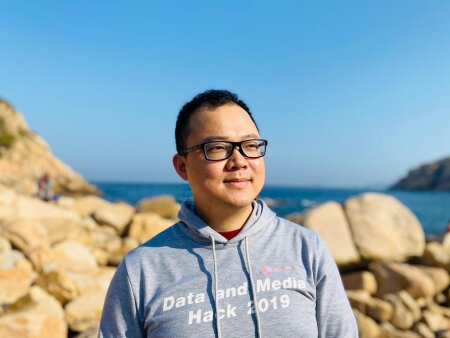
Zhang Xinzhi: Communication in the Age of Information Disorder
03Jun

In the age of information disorder, when fake news, clickbaits, sensational content, and other fabricated and maliciously manipulated content are prevailing on the internet, Dr Zhang Xinzhi conducts research to further understand how to guard against these omnipresent threats. His research largely focuses on two areas. The first relates to how ordinary citizens make sense of information relating to public affairs and health via their communicative behaviours on digital media. The second investigates how social media platforms and computer algorithms are changing the way media contents are produced and disseminated to audiences.
Connecting or Disconnecting on Social Media?
As social media has made it possible for individuals to only receive information of their own tastes by actively following or subscribing to certain accounts or joining discussion groups, this may also insulate people’s own beliefs from the rebuttal of opposing views by unfriending or blocking others. Confirmation biases, viewing new information within one’s prior beliefs and values, can be a result. This leads to an effect called echo chambers.
Echo chambers are especially dangerous in the age of information disorder. Many millions of people around the world mainly get their news from sources which stretch the truth to its limits to suit the audience’s points of view, or even state outright lies.
“When I started my PhD study in 2009, I was immersed with a lot of scholarly papers on the extent to which people connect themselves with others via social media, such as information seeking and socialising. Ten years later, when starting my first project supported by the General Research Fund (GRF) of the University Grants Committee (UGC) in 2019, I found the pressing issue of the day is how and why people disconnect with others—such as unfriending, quitting groups, and blocking contents—and how disconnection affects people’s knowledge and behaviours.”
Being open-minded, deliberative, and always trying to start open and mutually respectful communication is one of the keys to break the ice.
Dr ZHANG Xinzhi
Department of Journaism
Dr Zhang quoted a list of numbers about this issue around the world. “In 2015, a study found that around 16% of Jewish Israeli Facebook users engaged in unfriending or unfollowing. Later, in 2019, about 20% of Internet users in the U.S. mentioned that they had unfriended or blocked people from their network. Now in Dr Zhang’s on-going research, the numbers in Hong Kong have skyrocketed to 66% (blocking or hiding posts) and 61% (unfriending other accounts). “Blocking or unfriending itself may not be a complete hazard because it is the users’ freedom to create and curate their personal information sources in their online social network; however, in the long run, we shall be cautious about it because too intensive a disconnection may leave people no opportunity to be exposed to diverse information, and worse, social media platforms’ algorithm may also enhance the echo chamber effects because these algorithms may follow the users’ preferences. Being open-minded, deliberative, and always trying to start open and mutually respectful communication is one of the keys to break the ice.”

How Should We Implement Fact-checking?
Social media also brings challenges for fake news correction, or fact-checking. As fact-check services—either established by the news organisations or by the independent professional institutions—are becoming common, Dr Zhang is studying how fact-checking messages are produced, and how they can effectively reach the public. For example, are fact-check messages really effective in telling someone that something is fake or misleading, especially when the truth is at odds with people’s existing beliefs? Furthermore, do fact-check messages make the individual more likely to understand the subject matter more clearly? Research has found that corrective fact-check messages may backfire. Dr Zhang is currently working on a project to study this matter in a cross-cultural study, comparing Hong Kong, the United States, and the Netherlands. The project, also funded by the General Research Fund (GRF) of the University Grants Committee (UGC), plans to perform a series of content analysis inspecting the existing practices in fact-checking and to conduct online experiments to examine how people respond to fact-checking messages, to seek the optimal fact-checking approach.
In a forthcoming publication related to this project, Dr Zhang and his team traced and analysed 4,000 original social media posts published by nearly one hundred health journalists from several mainstream media outlets in the US during the early outbreak of Covid-19 and found that around 65% of the posts contained deliberative contents (i.e., arguments being supported by evidence, such as identifiable citation information, URLs, or multimedia elements); and as the pandemic situation became more severe, posts containing such elements received more likes and retweets. “We believe being transparent and explicating the traceable details of the events are important in public communication.”
Research Goals
I hope that my research will help people to be less controlled by their bias or stereotypes as well as social media and algorithms in how they receive and react to information circulating on digital media, thus allowing for more free and open dialogues within society.
Dr ZHANG Xinzhi
Department of Journaism
In future, Dr Zhang hopes his research will allow citizens to better use technology to receive accurate information, which would also benefit producers. “I hope that my research will help people to be less controlled by their bias or stereotypes as well as social media and algorithms in how they receive and react to information circulating on digital media,” Dr Zhang stated, “thus allowing for more free and open dialogues within society.”
Dr Zhang is an Assistant Professor in the Department of Journalism, School of Communication, and a member of the Augmented Creativity Lab. Coming to HKBU following attaining his Master’s and PhD at the City University of Hong Kong, he is the Programme Director of the MSc in AI and Digital Media Programme, and served as one of the founding members of the Data and Media Communication Concentration.
Contact Our Researcher

Dr ZHANG Xinzhi
Depratment of Journalism





